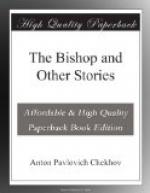“He had a gift for writing hymns of praise,” he said. “It was a marvel, sir; you couldn’t call it anything else! You would be amazed if I tell you about it. Our Father Archimandrite comes from Moscow, the Father Sub-Prior studied at the Kazan academy, we have wise monks and elders, but, would you believe it, no one could write them; while Nikolay, a simple monk, a deacon, had not studied anywhere, and had not even any outer appearance of it, but he wrote them! A marvel! A real marvel!” Ieronim clasped his hands and, completely forgetting the rope, went on eagerly:
“The Father Sub-Prior has great difficulty in composing sermons; when he wrote the history of the monastery he worried all the brotherhood and drove a dozen times to town, while Nikolay wrote canticles! Hymns of praise! That’s a very different thing from a sermon or a history!”
“Is it difficult to write them?” I asked.
“There’s great difficulty!” Ieronim wagged his head. “You can do nothing by wisdom and holiness if God has not given you the gift. The monks who don’t understand argue that you only need to know the life of the saint for whom you are writing the hymn, and to make it harmonize with the other hymns of praise. But that’s a mistake, sir. Of course, anyone who writes canticles must know the life of the saint to perfection, to the least trivial detail. To be sure, one must make them harmonize with the other canticles and know where to begin and what to write about. To give you an instance, the first response begins everywhere with ‘the chosen’ or ‘the elect.’ . . . The first line must always begin with the ‘angel.’ In the canticle of praise to Jesus the Most Sweet, if you are interested in the subject, it begins like this: ’Of angels Creator and Lord of all powers!’ In the canticle to the Holy Mother of God: ’Of angels the foremost sent down from on high,’ to Nikolay, the Wonder-worker— ‘An angel in semblance, though in substance a man,’ and so on. Everywhere you begin with the angel. Of course, it would be impossible without making them harmonize, but the lives of the saints and conformity with the others is not what matters; what matters is the beauty and sweetness of it. Everything must be harmonious, brief and complete. There must be in every line softness, graciousness and tenderness; not one word should be harsh or rough or unsuitable. It must be written so that the worshipper may rejoice at heart and weep, while his mind is stirred and he is thrown into a tremor. In the canticle to the Holy Mother are the words: ’Rejoice, O Thou too high for human thought to reach! Rejoice, O Thou too deep for angels’ eyes to fathom!’ In another place in the same canticle: ’Rejoice, O tree that bearest the fair fruit of light that is the food of the faithful! Rejoice, O tree of gracious spreading shade, under which there is shelter for multitudes!’”
Ieronim hid his face in his hands, as though frightened at something or overcome with shame, and shook his head.




